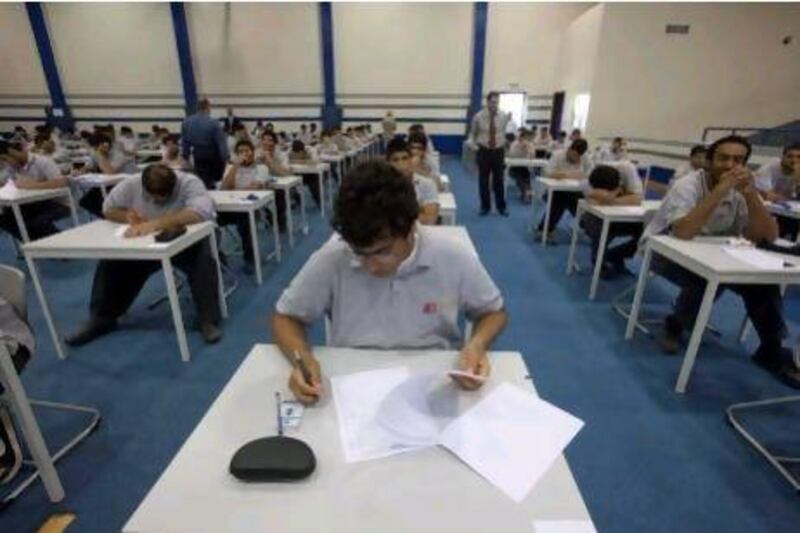DUBAI // Nawaf Abdullah is leaving secondary school with a clear plan for his future: join a mechanical engineering programme then take up a managerial position in the country's nuclear-energy industry.
Nawaf, 18, who spent the past three years at an Applied Technology High School (Aths), said his drive and ambition came from learning how important his contribution was to building the UAE.
"We are always reminded that nationals must be at the forefront of various sectors in sciences and engineering," said Nawaf. "We have to work harder."
About 3,000 pupils attend technology schools and share his views. The trend is captured in a newly released research paper, Building Citizens for the Arab Knowledge Economy - Evidence from the UAE.
The report details the research findings of Yale doctoral candidate Calvert Jones, who spent a year interviewing pupils from all seven Aths campuses in the UAE, and 2,265 pupils from 13 government schools in Dubai, Hatta and Ras Al Khaimah.
"My evidence shows the Aths campuses are attracting highly motivated students and maintaining that motivation," said Ms Jones.
"The other thing they have managed to accomplish is creating national pride and this is what policymakers are interested in."
Pupils at mainstream state schools displayed significantly lower levels of pride in the UAE, the study showed.
"While those in Aths schools showed an upward trend in these attitudes, pupils in the other schools showed a downward trend, a difference that may require policy attention," Ms Jones said.
Aths pupils regarded "contributing to the UAE society" as more important when choosing a career, while money was a more prominent factor for those at regular schools.
Abdullatif Al Shamsi, managing director of the Institute of Applied Technology (IAT), which runs Aths schools, said a rigorous selection process ensured only the most determined join. Pupils must pass an entrance test and an interview before being chosen.
"Still, one can never guarantee pupils' behaviour and that is where our campus initiatives kick in," Mr Al Shamsi said. "Lessons in citizenship are a systematic part of pupils' life from day one."
The IAT was set up in 2005 on the orders of Sheikh Mohammed bin Zayed, Crown Prince of Abu Dhabi and Deputy Supreme Commander of the Armed Forces, who wanted to create a career-based technical education system to produce scientists, engineers and technicians.
At Aths schools, classes are taught in English so pupils are prepared for university by the time they leave.
Pupils must complete 100 hours of community volunteering to graduate and take part in the Al Bayariq, or "The Flag", course designed in collaboration with the Armed Forces and police to make pupils more responsible and impart civic virtues.
Pupils receive Dh500 a month for attending classes and an extra amount for good discipline, which can be taken away if they misbehave.
Ms Jones, who conducted her study with the support of the Sheikh Saud bin Saqr Al Qasimi Foundation for Policy Research, said there was indication that pupils' values were made increasingly stronger by such practices.
The longer pupils studied at an Aths, she said, the more they valued "love for the country" and "determination and perseverance".
But Ms Jones said an unintended consequence of those motivations was the dulling of personal passion.
"Extrinsic motivation can crowd out the intrinsic drive," she said.
And a steady diet of leadership training could also set them up for failure, Ms Jones said.
"They are being steered into careers in the nuclear sector and semi-conductor [industry] where they envision themselves as leaders," she said. "It might be creating a super-entitled citizen."
Mr Al Shamsi disagreed, saying all of the pupils were made aware that things would not be handed to them without hard work.
"Gone are the days when Emiratis would get jobs because of their nationality or status," he said.
"Now they have to start at the bottom, roll up their sleeves and work. They have to gain the right experience to climb that success ladder."






